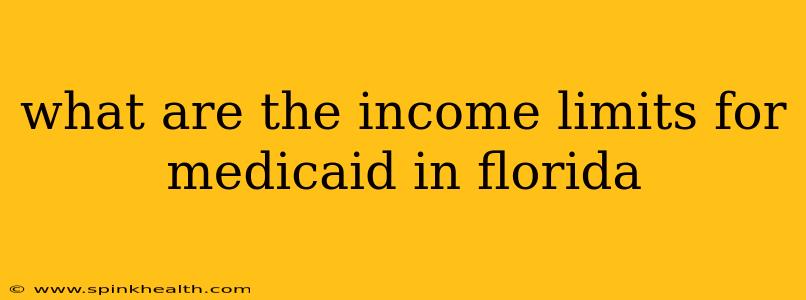Navigating the Maze: Understanding Florida Medicaid Income Limits
Florida's Medicaid program, known as Medicaid, provides crucial healthcare coverage to millions of residents. But eligibility isn't a simple yes or no; it hinges on a complex interplay of income, assets, and other factors. Let's unravel this complexity and explore the income limits for Medicaid in Florida. This isn't a substitute for official guidance, however—always check the official Florida Medicaid website for the most up-to-date information.
This story begins, not with numbers, but with a family. Imagine Maria and her two children, struggling to make ends meet. Maria works part-time, but her income barely covers rent and groceries. Healthcare costs loom large, a constant fear. Could Medicaid offer a lifeline? To answer that, we need to delve into the specifics of Florida's income limits.
What are the income limits for Medicaid in Florida?
There isn't one single income limit for Florida Medicaid. Eligibility depends heavily on several factors, including:
- Household size: A family of four will have a higher income limit than a single individual.
- Age: Children, pregnant women, and seniors often have different eligibility criteria.
- Disability status: Individuals with disabilities may qualify under different programs and income thresholds.
- Citizenship status: Eligibility rules may vary depending on citizenship.
This means that while a specific dollar amount cannot be readily stated, the income limits are regularly updated and vary considerably depending on the factors listed above. You must use Florida's official Medicaid eligibility calculator or contact the agency directly to determine your eligibility.
How are assets considered when determining Medicaid eligibility?
While income is a major factor, your assets also play a significant role. Medicaid limits the amount of assets you can own while still qualifying. This might include things like savings accounts, stocks, and bonds. However, there are typically exemptions for items like a home (with limitations) and a vehicle. Again, the specific asset limits vary greatly based on household size and other factors. Failure to disclose assets accurately can lead to penalties.
What if my income is slightly above the Medicaid limit?
Don't give up hope! Even if your income is just above the Medicaid limit, several other programs might assist you. For example, the Affordable Care Act (ACA) marketplaces may offer subsidized health insurance plans based on your income. Furthermore, hospitals and clinics often provide financial assistance to individuals and families struggling to afford care. Exploring these options is crucial if you don't qualify for Medicaid.
How do I apply for Florida Medicaid?
Applying for Medicaid in Florida can be done online through the state's official website or via paper application. The application process will involve providing documentation of your income, assets, and other relevant information. You will receive notification of approval or denial after your application is processed.
What documents do I need to apply for Medicaid?
The required documents vary based on individual circumstances, but you'll generally need documentation to verify your identity, income, citizenship status, and residency. It's best to gather these documents before you begin the application.
Are there different Medicaid programs in Florida?
Yes, Florida offers several Medicaid programs designed to cater to specific groups like children, pregnant women, seniors, and disabled individuals. Each program has its own income and asset limits.
In Conclusion:
Navigating Florida's Medicaid system requires careful attention to detail. The income limits aren't a simple number but a complex equation involving several factors. Remember to visit the official Florida Medicaid website for accurate and updated information and use their online tools to determine your eligibility. Don't hesitate to seek assistance from healthcare professionals or community organizations to help you understand your options and navigate the application process. The path to healthcare access can seem daunting, but with persistence and the right information, it's attainable.

